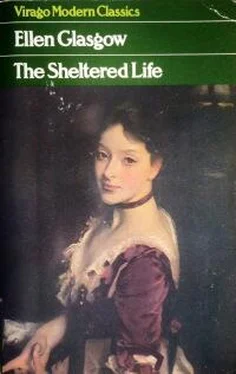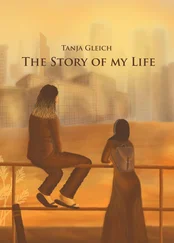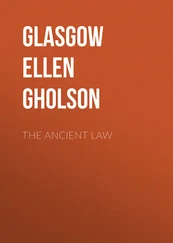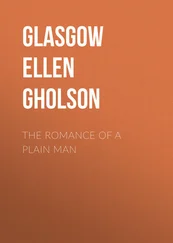Ellen Glasgow - The Sheltered Life
Здесь есть возможность читать онлайн «Ellen Glasgow - The Sheltered Life» весь текст электронной книги совершенно бесплатно (целиком полную версию без сокращений). В некоторых случаях можно слушать аудио, скачать через торрент в формате fb2 и присутствует краткое содержание. Жанр: Классическая проза, на английском языке. Описание произведения, (предисловие) а так же отзывы посетителей доступны на портале библиотеки ЛибКат.
- Название:The Sheltered Life
- Автор:
- Жанр:
- Год:неизвестен
- ISBN:нет данных
- Рейтинг книги:5 / 5. Голосов: 1
-
Избранное:Добавить в избранное
- Отзывы:
-
Ваша оценка:
- 100
- 1
- 2
- 3
- 4
- 5
The Sheltered Life: краткое содержание, описание и аннотация
Предлагаем к чтению аннотацию, описание, краткое содержание или предисловие (зависит от того, что написал сам автор книги «The Sheltered Life»). Если вы не нашли необходимую информацию о книге — напишите в комментариях, мы постараемся отыскать её.
The Sheltered Life — читать онлайн бесплатно полную книгу (весь текст) целиком
Ниже представлен текст книги, разбитый по страницам. Система сохранения места последней прочитанной страницы, позволяет с удобством читать онлайн бесплатно книгу «The Sheltered Life», без необходимости каждый раз заново искать на чём Вы остановились. Поставьте закладку, и сможете в любой момент перейти на страницу, на которой закончили чтение.
Интервал:
Закладка:
"Yes, I know." Jenny Blair sighed and looked at the houses they were passing. "Oh, Grandfather, I do hope she will get well!" she said passionately, after a long pause. "I couldn't bear it if anything happened to her!"
"Naturally we feel anxious, my darling, but we have every reason to hope."
"I couldn't bear it if she were never to look like herself again. I couldn't bear it."
So that was the trouble! How unjust it was that youth should be condemned to bear so many vicarious burdens. As one grew older and age hardened the imagination, as well as the arteries, a comfortable numbness protected the heart and the senses alike.
"There, there, my dear," he said, patting her hand; and he repeated gently, while a tear stole over the violet pouch beneath his bad eye, which had lost that last amenity of civilization, the power to control emotion, "We have every reason to hope."
"John seemed," she hesitated for a word, "so angry about—about everything. He talked to me yesterday just as if somebody or something had injured him."
"He is young yet, and most young minds think, if they think at all, with a sense of injury. He wants to blame something, but he has lost his bearing and can't decide where the blame ought to rest. I know that because I went through it myself. That is why I am thankful that age has closed, like the shell of a clam, over my nobler impulses. I can't fight for lost causes, I can scarcely condemn successful causes, any longer."
"But, Grandfather, life is so beautiful."
"I hope you will always find it so."
For a moment she was silent; then she asked in an agitated voice, "Do you suppose she still cares so much, Grandfather?"
"Cares, my dear?"
"I mean," the words were spoken with a stammer, as if she were overcoming an impediment in her speech or her mind. "I mean Mrs. Birdsong. Do you think she still cares as much as she used to care?"
"For her husband? Why, of course she does. Have you any reason to think otherwise?"
"No, no reason in the world. Only I wondered. Can you see why she ever fell so madly in love?"
"You asked me that once before. No, my child, one is never able to see a reason in love. But do you really dislike George? Has he done anything to annoy you? If he has," the thick eyebrows beetled angrily, "I'll speak to him as soon as he returns."
"No, no." She looked at him with terror, a look that reminded him of a rabbit. "He hasn't done anything. He doesn't take any notice of me. But I can't abide him. I wish I never had to see him again as long as I live."
"Well, well, my faculties must be growing rusty." Anger softened while he spoke into perplexed wonder. "Why I thought you and George were friendly enough." After all, one could trust to the intuitions of youth. When he was young himself, he had disputed the truth of this precept; but as age fastened upon him, he had returned to the worship of adolescence and other myths of primitive culture. Yet he had believed that he was still young for his years. Young, except in his legs, and in the way important things sifted out of his mind and left an accumulation of rubbish. Curl-papers, and the look in his grandfather's face when he blooded him, and the stench of that runaway slave he had found in the forest at Stillwater. Queer how trifling impressions, the merest snatches of sensation, flickered to life again. Even now, he could not walk in a dim light through a negro quarter, he could not stumble upon the acrid smell of old sweat anywhere, without having some dark corner of his memory unfold like the radiating sticks of a fan, and that autumn scene spread out before him as vividly as if it were painted.
"Are you tired, Grandfather?" Jenny Blair asked, as they crossed the pavement on the way to the house.
"Not tired, my dear, only feeling my years."
"But you aren't really old. You don't act old—not very old."
The General laughed. "Thank you, my dear. You are almost but not quite, as tactful as your mother. Well, we'll go in and see if William is still alive. He's approaching the end, too, and he knows it."
As they stood in the hall, the girl inquired in her softest tone, "Do you need me any longer?"
"Why, no, I don't need anybody. I'll speak a few words to your mother, and then William and I will go out into the park."
"I was going to do a little shopping, but, of course, if you want me--"
"Not a bit. I know my own way about."
Flying upstairs, Jenny Blair remembered, with an exquisite suspense, a joyous abandonment, that she had only three days to wait. Safe within her own room, she collected her faculties, paused on a note of pure rapture, and asked herself uneasily, "Waiting for what?" For she did not mean anything, she insisted, gazing through the back window down on the garden, where little Erminia was building a house of pebbles and sticks in the deep roots of the sycamore. All she wanted was to live her own life and be happy, without hurting anybody or making the least bit of trouble. Nobody, not even her mother, could reproach her for that. Suddenly her heart cried out, and she spoke in a whisper. "I want to be happy! If I can't be happy, I'd rather be dead!" Even though she despised him, she knew that she couldn't be happy again so long as he was away. "I hate him so much that I cannot bear it if he does not come back. It is just like love, only it isn't love." Nothing could be more amazing than the way love and hate ran into each other, and melted and blended, and felt so exactly alike when they caught fire and flamed up.
The door into the hall was ajar, and Aunt Etta's voice floated plaintively from the back room on the opposite side of the house. "Is that you, Jenny Blair?"
"Yes, I'm going out." Crossing the hall, she entered the room and stood beside the couch on which Aunt Etta was lying. "Do you need anything?"
"Nothing but some thinner nightgowns. But I told Isabella. She is going to look for them."
"Has she been here this morning?"
"Yes, she's just gone out shopping. All the children are downstairs, and they make such a noise I can't hear myself think. They must drive Isabella out of her senses."
"Oh, she doesn't mind. She always liked noise."
"I know she does. It's a pity Joseph doesn't talk more."
"Well, I like Joseph. I always did."
"Do you know where little Erminia is? She is quiet for once."
"That's because she is playing by herself. She is building a house in the roots of the sycamore. Isn't your head better this morning, Aunt Etta?"
Aunt Etta sat up on the couch and smoothed the hair from her forehead. She held a novel with a yellow back in her long thin hands, and her eyes, the colour of frosted plums, were fixed on the feathery blossoms of a mimosa tree. When she came home every day from the doctor's office, her nostrils were packed with an ointment which was supposed to relieve her pain, but had never done so except for a few minutes. She was interested now, Jenny Blair knew, in the strange young physician who treated her every morning, and then forgot all about her until he saw her again. Poor Aunt Etta's infatuations began always with this kind of false dawn and ended in a sultry twilight of disappointment. It did not seem fair that she should have exactly the same mistake happen over and over again; but, then, did anything ever seem fair? Mamma said she had fallen into the habit of being disappointed in love, and that it was one of the very hardest habits to break.
"Perhaps," Jenny Blair said, trying to sound sympathetic, though, as she told herself impatiently, one could not go on feeling sympathetic for ever, "perhaps Doctor Pembroke will really cure you."
With her thumb keeping the place in her book, Aunt Etta lay back on the high pillows and withdrew her moody gaze from the mimosa tree. There were times, her look said, when she preferred ugliness, when ugliness hurt less than beauty, which was too much alive. For ugliness demanded nothing, had no exactions, left one, without effort or excitement, in the long peace of futility.
Читать дальшеИнтервал:
Закладка:
Похожие книги на «The Sheltered Life»
Представляем Вашему вниманию похожие книги на «The Sheltered Life» списком для выбора. Мы отобрали схожую по названию и смыслу литературу в надежде предоставить читателям больше вариантов отыскать новые, интересные, ещё непрочитанные произведения.
Обсуждение, отзывы о книге «The Sheltered Life» и просто собственные мнения читателей. Оставьте ваши комментарии, напишите, что Вы думаете о произведении, его смысле или главных героях. Укажите что конкретно понравилось, а что нет, и почему Вы так считаете.












